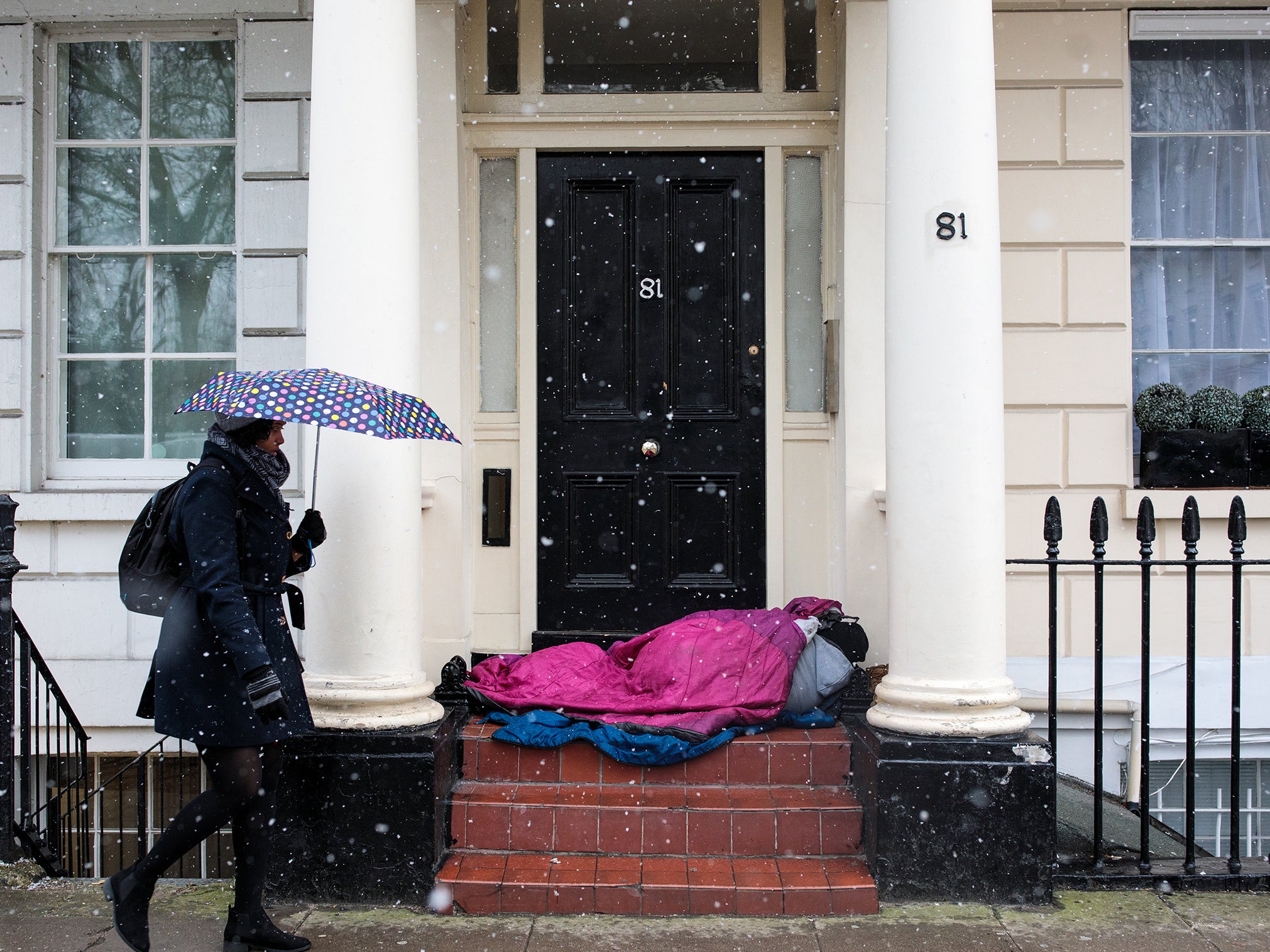Minister says being smelly shouldn’t be arrestable offence amid backlash over legislation
Over 40 Tory MPs expected to rebel against elements of legislation that criminalises homelessness
Your support helps us to tell the story
From reproductive rights to climate change to Big Tech, The Independent is on the ground when the story is developing. Whether it's investigating the financials of Elon Musk's pro-Trump PAC or producing our latest documentary, 'The A Word', which shines a light on the American women fighting for reproductive rights, we know how important it is to parse out the facts from the messaging.
At such a critical moment in US history, we need reporters on the ground. Your donation allows us to keep sending journalists to speak to both sides of the story.
The Independent is trusted by Americans across the entire political spectrum. And unlike many other quality news outlets, we choose not to lock Americans out of our reporting and analysis with paywalls. We believe quality journalism should be available to everyone, paid for by those who can afford it.
Your support makes all the difference.A minister has warned people should not arrested just because they smell amid a mounting backlash over a fiercely criticised piece of legislation which criminalises homelessness.
Draft legislation for the Criminal Justice Bill seeks to criminalise “nuisance rough sleeping”, stating this includes anyone who has slept rough, is “intending to sleep rough”, or “gives the appearance” of sleeping rough and causes a nuisance while doing so.
The definition of so-called “nuisance” even includes “excessive smells”. Offenders can be hit with a month in prison or fines of up to £2,500 if convicted.

Education Secretary Gillian Keegan told Sky News on Tuesday she would back government policy but warned people “should not be arrested just if they smell”.
She added: “I haven’t looked at that detail of it, but I guess the word is ‘excessive’, and I don’t know what they mean by that.”
Her comments come as over 40 Conservative MPs are expected to rebel against elements of the controversial legislation that criminalise “nuisance” rough sleepers.
It comes after leading housing charities recently told The Independent they fear measures criminalising homelessness in the Criminal Justice Bill could hit women hardest.
The new legislation, expected to become law before the general election, includes vague ill-defined measures that mean sleeping in doorways or hidden spots could be defined as nuisance behaviour and therefore criminalised.
Campaigners are fearful women could be worst hit due to the fact they often seek out hidden spots to protect themselves from sexual violence, harassment and other dangers when sleeping on the streets.
A former rough sleeper recently told The Independent about her experience of being homeless on and off from the age of 16 until her forties as she branded the bill a “Dickensian” piece of legislation.
“It’s a disgrace,” the now 54-year-old said. “If the government thinks the way to end homelessness is to outlaw it, then they are not facing the issue of homelessness. To say, ‘you look homeless, so I’m going to arrest you’ – that is leaving the police with an untold amount of power to just arrest anybody that they like.”
Former home secretary Suella Braverman - who provoked criticism when she referred to rough sleeping as a “lifestyle choice” - introduced the legislation to parliament.
Senior government sources say the bill has been put on hold while ministers consult with MPs from both the left and right of the Tory Party who have raised fears about the proposals, The Times reports.
Bob Blackman, a Tory MP for Harrow East, has tabled measures to ensure the government meets its initial pledge to repeal the 1824 Vagrancy Act.
The Criminal Justice Bill has been branded as “the Vagrancy Act 2.0 on steroids” by senior Lib Dem MP Layla Moran – in reference to the intensely criticised 200-year-old piece of legislation.
While parliament voted to repeal the Vagrancy Act in February 2022, this has not yet come into force, and the advent of the Criminal Justice Bill signifies a U-turn from the government given the draconian measures included in the legislation.

Join our commenting forum
Join thought-provoking conversations, follow other Independent readers and see their replies
Comments